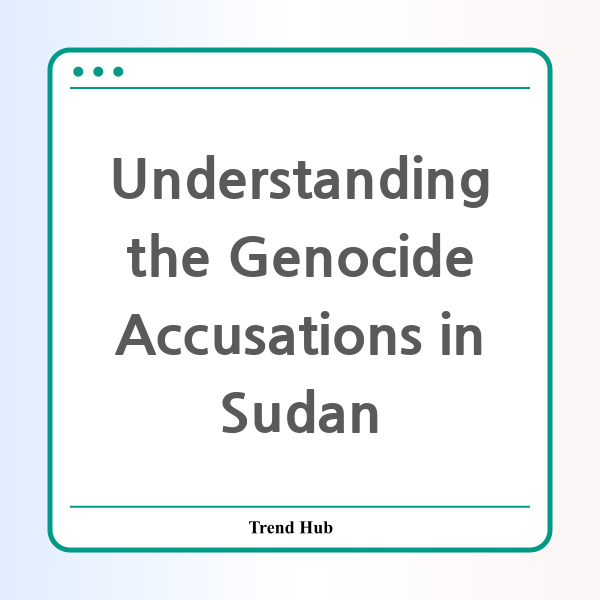* This website participates in the Amazon Affiliate Program and earns from qualifying purchases.

In a world where humanitarian crises continue to unfold, the situation in Sudan has taken a dire turn with accusations of genocide against the Rapid Support Forces (RSF), a paramilitary group. The United States has recently accused the RSF of systematic atrocities against the Sudanese populace, leading to significant sanctions on its leader, Mohamed Hamdan Dagalo, commonly known as Hemedti. But what does this mean for Sudan, its people, and the international community?
US Secretary of State Antony Blinken made a grave announcement, asserting that Hemedti and the RSF have committed genocide during the 20-month conflict that has ravaged the nation. This declaration is underpinned by reports of extreme violence and targeted ethnic killings, including the murder of men, boys, and even infants, alongside brutal sexual assaults against women. The ruthless conduct of the RSF and its allied militias has drawn international condemnation and raised urgent questions about the future of governance and humanitarian aid in Sudan.
Since the conflict escalated in April 2023, the RSF has been embroiled in fierce battles against the Sudanese military, resulting in one of the worst humanitarian disasters globally. The horrific toll of this conflict reportedly includes the death of up to 150,000 people, with over half of the Sudanese population—24.6 million individuals—currently in urgent need of food aid. Famine has been declared in multiple regions, highlighting the catastrophic impact of the ongoing violence.
In response to the sanctions imposed by the US, the RSF has criticized the Biden administration, claiming that such measures illustrate a failure to address the ongoing crisis effectively. This implies a deepening of the already complex situation in Sudan and raises concerns about the potential for further negotiations aimed at resolving the conflict.
The sanctions encompass not only Hemedti and his immediate family but also several RSF-owned companies linked to the lucrative gold trade. These companies, primarily based in the United Arab Emirates, are vital for funding and arming the RSF, according to US Treasury statements. With the RSF controlling approximately 50% of Sudan, including significant gold mining regions, this economic stranglehold presents a formidable challenge to any peace efforts.
Furthermore, it is crucial to recognize that both the RSF and the Sudanese military share responsibility for the violence and humanitarian crisis afflicting the nation. Blinken's remarks underscore that neither faction possesses the legitimacy to govern a peaceful Sudan post-conflict.
The recent US actions may not produce immediate changes on the ground regarding fighting, yet they exert increased pressure on regional backers to reconsider alliances and trade relations with the RSF. The sanctions also complicate any attempts to establish a new government within regions controlled by the RSF.
Despite the grave circumstances, there remains a glimmer of hope as the Sudanese army has recently indicated a willingness to accept mediation efforts to seek resolution, potentially involving Turkish and UAE support. Could these diplomatic overtures finally lead to a ceasefire, or are they merely a temporary reprieve in a much larger battle?
As the situation continues to evolve, the international community watches closely, acknowledging the severe implications of the genocide designation. It is a turning point, highlighting the urgent need for global action to address the ongoing humanitarian crisis and work towards a sustainable peace in Sudan.
* This website participates in the Amazon Affiliate Program and earns from qualifying purchases.